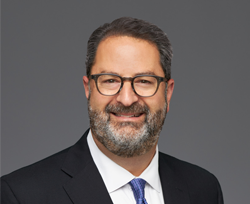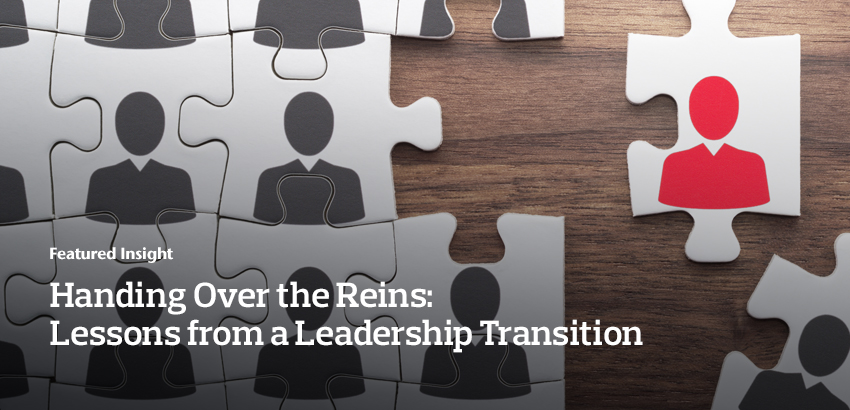Aon | Professional Services Practice
Handing Over the Reins: Lessons from a Leadership Transition
Release Date: June 2022 
Robert Gerber
Managing Partner
Scott Fisher
Partner and former Managing Partner
Succession planning is about preparing for the future, the growth of the firm, getting stronger as you go along, and consciously creating opportunities for people to get comfortable with making decisions and being a leader. Some firm leaders find it difficult to relinquish authority. Often, managing partners hold on too long and their legacy becomes more important to them than the organization. Compensation can also play a role in succession planning, to the point where it is harmful to the firm’s growth.
Scott, how did you know it was time to step down after being managing partner from 2016-2021?
Scott: It was always the case that I wouldn’t be managing partner for much longer than I was. In my view, it is better for a professional service organization to gain new perspectives. Bobby and I are well aligned on most things, but we are different voices and have different approaches. I think that the days of “run it for 25 years” as managing partner are probably not the model for the future. Ultimately, that is better for the organization as it allows for continual leadership development—getting in new, fresh, and better ideas. Timing matters: we were in a different place in the organization six years ago than we are today. My focused mission was to transition the business and leadership of the firm from our founders to the next generation and to develop and execute on a strategic plan that seizes on our unique position in the market. I was able to achieve both objectives during my tenure as managing partner.
I agree that when a leader has a “me-first” mentality, you start losing confidence that decisions are being made in the best interests of the organization. Ultimately, leaders often must act with imperfect information, and you make your best judgments based on the information you have at the time. Sometimes you get it wrong and when you do, you must own it, be quick, nimble and able to pivot, and make a new decision with the organization’s best interests in mind.

You can’t be an effective leader if your identity is tied up in the fact that you are the managing partner. You need to be yourself, and you need to do what you think is right, guided by your principles, your vision, your integrity. Challenges in transition arise when you have individuals whose identity is wrapped up in their role and they forget that the role exists for the benefit of the organization and not for their own benefit.”
Scott Fisher
Partner and former Managing Partner, Neal Gerber Eisenberg
I feel that when you are picking a leader you want someone who is equipped to recognize when it’s someone else’s time to do it their way. That’s part of the diligence and discipline you need in making the decision in the first place.
Scott, as the former managing partner of Neal Gerber Eisenberg, how did you come to identify Bobby as your successor?
Scott: As managing partner, I needed to think about leadership development and leadership succession. From the beginning, we were identifying who we thought had the potential to be leaders of our firm and provided them with real world opportunities.
Prior to becoming managing partner, Bobby led the Corporate & Securities practice group, chaired our hiring committee, and served on the executive committee. He embodies the qualities we wanted in a leader: he has a “firm-first” mentality, he had experience leading one of our biggest groups, and he is well respected throughout the organization. It was a natural choice.
There were several key components that played a role in identifying the next leader. First, ensuring we were continually identifying talent and giving that talent opportunities to both demonstrate their leadership capabilities and, more importantly, learn how to lead. If you are running an organization and not consistently thinking about your next leadership or next two leadership terms, it leaves your firm exposed.

Succession planning will continue to be a big part of my tenure. It’s important to me to be creating leaders and giving people opportunities to develop their own leadership skills because ultimately that’s what’s going to make our firm and organization better.”
Bobby Gerber
Managing Partner, Neal Gerber Eisenberg
Second, it was critical for us to ensure we were identifying people who had the qualities that we felt were important for the organization, notably, high emotional intelligence, integrity, and a priority of making decisions in the best interests of the organization.
I think leaders often tend to think that their successor should have the same qualities as themselves. While Bobby and I share many of the same qualities, I recognize that Bobby has a lot of great qualities that I don’t have. I think that it is very important to choose a leader for your organization at that moment and into the future, not based on the past.
Bobby, when did you become comfortable with your decision to become managing partner?
Bobby: Throughout my life, I’ve always wanted to be part of the fabric and culture of whatever organization I was involved in, whether it was in school, through charitable organizations, or at the firm. I’ve always sought opportunities that would allow me to make the organization I’m involved in a better place. Having spent my entire professional career at Neal Gerber Eisenberg, I strongly relate to our ethos and culture, and care deeply about strengthening that culture, as well as building on our unique value proposition. As practice group leader and hiring committee chair, I have been very committed to the growth and success of every individual at Neal Gerber Eisenberg and considered the role of managing partner as an extension to the leadership roles I have previously held.
What has been the biggest challenge in the transition, between the two of you?
Bobby: Scott did a tremendous job transitioning. We planned a series of meetings over five months where we went through issues, topics, challenges, and strategy.
Scott has also been an unbelievable friend and mentor. The role of managing partner can be lonely as there aren’t many people you can turn to for an open debate and discussion. As Scott mentioned, you must be guided by your principles, vision, and integrity. I feel fortunate to have our previous leaders available to me as sounding boards.
I think the bigger challenges are not from our transition but the environment in which we are operating, coming through a pandemic and making decisions such as return-to-office.
Scott: In transitioning, I wanted to put Bobby in a position to be successful. At that time, the firm had been performing exceptionally well, we had completed certain strategic goals, and had an incredible administrative infrastructure that gave both of us comfort that there was stability. Bobby and I worked closely together to ensure that the transition was a smooth one and that there was confidence within the firm about its strength and security. The firm under Bobby’s leadership has continued to grow and be successful.
Scott, it can be difficult to let go of a leadership position but, being a “firm-first” person, you knew you were putting the firm in a great spot. What were some of your challenges?
Scott: On a personal level, it can be hard not to be in the room anymore. There is a challenge in letting go of being in the position of making decisions, without regard to whether you are confident in the decisions being made, which I am unquestionably confident about under Bobby’s leadership.

If you get it right, you have the right leader at the right time. Scott’s leadership style and his commitment and values really drove what we needed at the moment of transition from our founders to the next generation and he did it successfully.”
Bobby Gerber
Managing Partner, Neal Gerber Eisenberg
One of the biggest decisions in becoming Managing Partner is stepping out of your comfort zone, transitioning a lot of your client work to others, and going out on your own into this new leadership role. Did you give some thought as to when you will have to come back to partner/client work?
Bobby: Scott’s successful transition back to practicing has led me to be comfortable with the change. I’ve also thought that during Scott’s time as managing partner, he was able to maintain his practice to an extent. It is very challenging to balance the demands of being a corporate lawyer while managing the firm at the same time and do them both well. I am still involved to a certain extent in client matters, however, transitioning my client work to others was something I did have to get comfortable with, but we have strong partners in our corporate group that I’ve worked very closely with on our clients for years so for me there was a natural fit for which partners would be best for each individual client.
Bobby, can you comment on some of your long-term goals?
Bobby: We’ve achieved many of the goals we set out in the firm’s strategic plan, and with any dynamic plan it is always a good idea to re-visit the plan and its objectives every few years. We are in the process of doing that now, as we consider the changes to our industry, our clients and their businesses, and the world we live in today. As a values-driven business, it is important for me to ensure that we are continuing to prioritize making the world a better place for our people, our clients, and our communities. My goals with regard to corporate social responsibility are to continue to focus our sustainability efforts on developing quantifiable environmental standards that minimize the impact our firm has on the environment. I am committed to continuing Scott’s legacy of being industry leaders in focusing on the importance of diversity, equity, and inclusion (DE&I) as we continue to support and sustain the holistic well-being of our attorneys and staff. I want to be able to continue the steps we have taken in the last five years in these areas while, of course, also thinking of growth, demand, and client service. Succession planning and leadership development continues to be a top priority of mine as well.
How are you addressing inclusion in your succession planning at Neal Gerber Eisenberg?
Bobby: While we have done well for a while now in increasing the diversity of our incoming associate classes, we recognize that work still needs to be done in having our leadership better reflect our community with regard to diversity. Our intentionality in our succession planning has been further formalized with the adoption of the Mansfield Rule, ensuring a succession plan for each leadership position that includes individuals from traditionally underrepresented groups, and being mindful of building the pipeline for leadership positions.
I have charged the hiring committee and recruiters with considering a true diversity of candidates for every single position for which we are recruiting, whether for our summer program or lateral positions. We are not meaningfully going to change and provide ourselves with the opportunity to have more diverse leaders in the future unless we continue to alter the diversity mix of our population and have an impact.

The “I” for inclusion also requires the “I” for intentionality. As an organization, we have taken steps to be much more intentional about who we are to ensure that we look like our clients in the communities we serve.”
Scott Fisher
Partner and former Managing Partner, Neal Gerber Eisenberg
Scott: We also have DE&I on our agenda at each executive committee meeting so it is front and center for the leadership. Another initiative is our sponsorship program that matches a member of our executive committee with a protégé from a traditionally underrepresented group. Our size has given us a strategic advantage, providing us with the opportunity to develop the relationships that will allow us to more rapidly and successfully develop a more diverse, equitable, and inclusive workplace. We’ve been intentional about changing perceptions. Changes in the composition of our groups reflect the intentionality of the firm to ensure that our firm, our partnership, looks more like our communities and clients. Everyone can be themselves at work everyday, no questions asked.
Describe your culture.
Bobby: Our culture comes down to the collection of our individual experiences. We have a culture that is industrious and inclusive and has a family feeling. I think people feel extremely connected to the firm. We learned during the pandemic how important that was and we are now looking at how we continue to build that culture in this new hybrid environment. In one respect, we were able to build that culture by being in one place; we saw each other, we knew each other, and the executive committee would know everybody in person. I think it comes back to the “I” word of intentionality, understanding that it can be done both ways. Since we can’t always be in the office, we must be more intentional about providing those opportunities and continue to share the stories and history of the firm.
Scott: I agree with Bobby. Respect is also an important value at every level of the organization. Inclusion is a huge part of who we are and who we have become as an organization. As Bobby touched on, we are industrious and collaborative. We value hard work and are committed to supporting each other.

Your culture is the day-to-day experiences of your people. Ultimately, we are focused on making sure those experiences leave them feeling proud of where they work and that they can be their authentic selves.”
Scott Fisher
Partner and former Managing Partner, Neal Gerber Eisenberg
Succession planning does not stop at a leadership transition. A successful approach requires a continuous focus on talent identification and development, while embracing the values and culture of a firm that will carry it forward. A leadership transition can be challenging personally, but an effective leader will have a strong commitment to the firm, its people, and clients.
Above all, recognize your time, and appreciate that it is about the legacy of the firm. Be the leader.
Contact
The Professional Services Practice at Aon values your feedback. To discuss any of the topics raised in this article, please contact Audrey Jenner.
Audrey Jenner
Vice President and Director
Montreal

